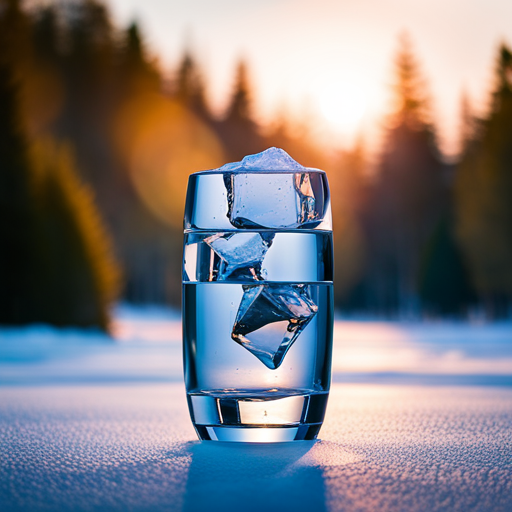Are you tired of subpar ice that melts quickly and doesn’t provide the necessary chill for your drinks? The quality of the ice you use can greatly impact the taste and overall experience of your beverage. That’s why understanding the difference between hard water and clear ice is crucial for achieving the perfect drink.
Hard water, which contains high levels of calcium and magnesium salts, can cause significant damage to ice machines, leading to costly repairs and downtime. On the other hand, clear ice made from pure water is denser and harder, making it ideal for commercial use.
In this article, we’ll explore the effects of hard water on ice machines, the benefits of using clear ice, and methods for purifying water to create the perfect ice. Get ready to elevate your drinks to the next level with the cold truth about hard water vs. clear ice.
Key Takeaways
– Hard water contains high levels of calcium and magnesium salts, which can cause expensive damage to ice machines through corrosion, slime buildup, and scaling.
– Clear ice, which is made from purified water, has greater density and hardness than soft ice, making it ideal for commercial use.
– Soft ice is made from hard water and contains impurities, which can make it less dense, quicker to melt, and brittle.
– Various methods, such as phosphate filters, salt-based water purifiers, and salt-free water purifiers, can be used to prevent scaling and damage to ice machines caused by hard water.
Ice and Water Quality
If you want clear and hard ice, it’s important to ensure your water quality is free from calcium and magnesium salts, which can cause scaling and damage to your ice machine. To achieve this, water filtration is crucial in commercial ice production.
There are various methods of water filtration, such as using phosphate filters, salt-free water purifiers, and salt-based water purifiers, each with its own benefits and drawbacks. Phosphate filters form ionic bonds with calcium and magnesium, preventing them from sticking to surfaces and causing scaling.
Salt-based water purifiers use ion exchange to reduce mineral concentration in the water container. Salt-free water purifiers, on the other hand, crystallize minerals present in the water, preventing them from sticking to surfaces.
By using these methods, you can ensure that your ice is clear and hard, and your ice machine is protected from damage caused by hard water.
Impurities and Density
You’ll notice a significant difference in the appearance and melting rate of ice made from water with impurities compared to pure ice due to differences in density. Impurities in water, such as calcium and magnesium salts, can make ice less dense and more prone to melting quickly.
Soft ice, made from hard water with impurities, is often used in residential settings but isn’t recommended for commercial use due to its lower density and shorter lifespan. To increase the density and hardness of soft ice, core removal techniques can be used to remove impurities and create a purer form of ice.
However, even with core removal, soft ice is still more brittle and prone to breaking compared to hard ice made from pure water. Hard ice, which is completely pure and has greater density and hardness, is ideal for commercial use and can withstand the harsh conditions of ice machines without promoting scaling or corrosion.
So, while soft ice may be more accessible for residential use, hard ice is the superior choice for commercial settings.
Preventing Damage and Scaling
To prevent damage to your ice machine, it’s important to take steps to prevent scaling caused by dissolved minerals in the water. Scaling occurs when minerals in hard water stick to surfaces after the water has passed or evaporated, leading to corrosion, slime buildup, and scaling.
One way to minimize corrosion is by choosing the right water purifier. Salt-free water purifiers crystallize minerals present in the water, preventing them from sticking to surfaces. On the other hand, salt-based water purifiers use ion exchange to reduce mineral concentration in the water container. Both methods are effective at preventing scaling and ensuring the longevity of your ice machine.
Another way to prevent scaling is by using phosphate filters. These filters form ionic bonds with calcium or magnesium, preventing them from sticking to surfaces and causing scaling. By using phosphate filters, you can also minimize the amount of dissolved minerals in the water, ensuring that your ice is pure and free from impurities.
Overall, preventing damage and scaling in your ice machine is crucial to maintaining its efficiency and longevity. By choosing the right water purifier and using phosphate filters, you can ensure that your ice machine stays in top condition and produces clear, hard ice that’s perfect for commercial use.
Conclusion
So there you have it, the cold truth about hard water and clear ice. Now that you know the importance of water quality for making ice, you can take steps to ensure your ice machines produce the best possible product.
By using water purification methods such as reverse osmosis or water softeners, you can prevent damage to your equipment and create clear, dense ice that will impress your customers.
Remember, when it comes to ice, quality matters. Don’t let hard water ruin your ice or your equipment. Take action today to improve your water quality and enjoy the benefits of clear, refreshing ice.
Your customers (and your wallet) will thank you.
